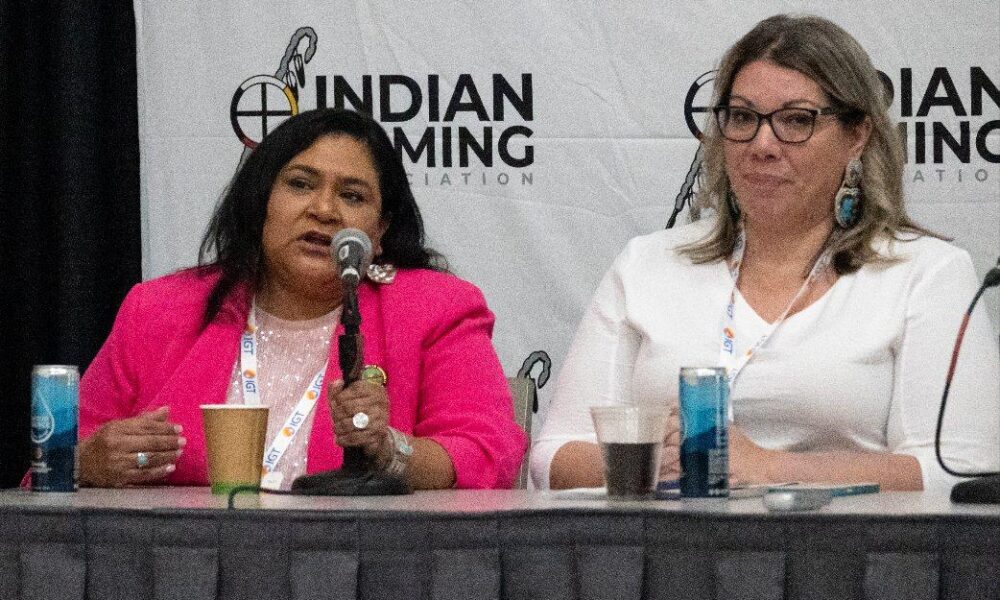Tribal casinos have been a frontrunner in adopting and embracing emerging technologies to enhance their operations and guest experiences.
That’s the consensus from a panel discussion at the Indian Gaming Tradeshow & Convention titled “The Digital Evolution of Tribal Gaming: Embracing Emerging Technologies,” which covered implementing next-gen technologies to drive efficiency, improve player engagement, and maintain a competitive edge in the ever-evolving gaming landscape.
The program was moderated by Julie Hakman, president and managing partner of InstHire, and included Robin Villareal, chief information officer of the Gila River Hotels & Casinos; Missy Stanisz, senior director of product manager at Everi; Kelly Myers, director of governmental affairs for Gaming Laboratories International; and Sequoyah Simermeyer, vice president of partnerships with FanDuel.
“So many of the advancements in gaming have come from tribal gaming,” Hakman said. “Indian gaming has been the hallmark for innovation from the beginning. When we went to TITO, people said if those coins don’t drop, it’s not going to happen. Do you see coins dropping anymore? No, you don’t. Emerging technologies are critical.”
One of those innovations is cryptocurrency and Stanisz said it’s no surprise that tribes have led that effort. In March, the Choctaw Casinos & Resorts in Oklahoma announced that customers can fund their gaming with crypto. According to Everi, it’s the first time cryptocurrency and digital assets as a direct source of liquidity have been available in the U.S. for gaming patrons.
“The fact that someone is leading in that space and it isn’t Caesars or MGM, but a tribe, shows tribes have always been first for innovation. It’s going to be interesting for the bar that it sets and how other tribal regulators start approaching it.”
Stanisz said the new technologies she continues to see involve cashless gaming and igaming.
Simermeyer, former chair of the National Indian Gaming Commission, said adoption of new technology that starts with Class II gaming has made tribal casinos sustainable over the decades.
“Tribal leadership, operations, and the regulatory community are all mindful of that,” Simermeyer said. “It’s also important that tribal leadership at the governance level was always aware of how gaming as an economic enterprise presented opportunities to leverage other policy objectives. When looking at new technology, whether it’s crypto or anything else, there’s the opportunity to match up with education, workforce, economic development, and public safety objectives that the governance body may be contemplating as part of their long-term strategy.”
Villareal said it’s important that security teams be educated and be ready for new technology and innovation. As it’s integrated into the system, the information technology and security teams have to be at the table, because it’s commonplace that those teams aren’t brought in when new technology is added.
Myers said not only is it important to bring in IT staff, but also to involve regulators early on, especially when it comes to something new like cryptocurrency.
“New ideas are sometimes scary, but when I first started, we were cashing checks and making sure they wouldn’t bounce,” Myers said. “There will always be something new to bring in a new player and having a key team is important. All players have to be involved in this.”
Villareal said a “lot of organizations out there (whether tribal or commercial) have already been there and done that” and it’s important to reach out to them when considering new technology.
“We reach out to people who have gone down that path,” Villareal said. “Sometimes you’re the first. At our property, we’re usually first to market for a lot of technology. We’re the guinea pig and we’re helping vendors improve their products. It’s a double-edged sword to be first to market, but reaching out to other people who’ve experienced or implemented new technology is also helpful.”
Villareal said she’s always on the lookout for new ideas and has learned a lot from both the commercial and tribal industries.
When checking out a hotel room or any property, it’s important to look at the “wow factor,” then implement and make it better, Villareal said in a discussion about attracting millennials to properties.
“When you’re an innovative type of organization, you start looking at things like that and want to make things better,” Villareal said. “For me, it’s about using my cellphone and going into a hotel room and connecting to the sound system and having the lighting go off. I can have my own little party based on a cell phone. You have to think about that innovation and user experience. If you can get a young person to say this place is cool, you’ve hit the mark.”


